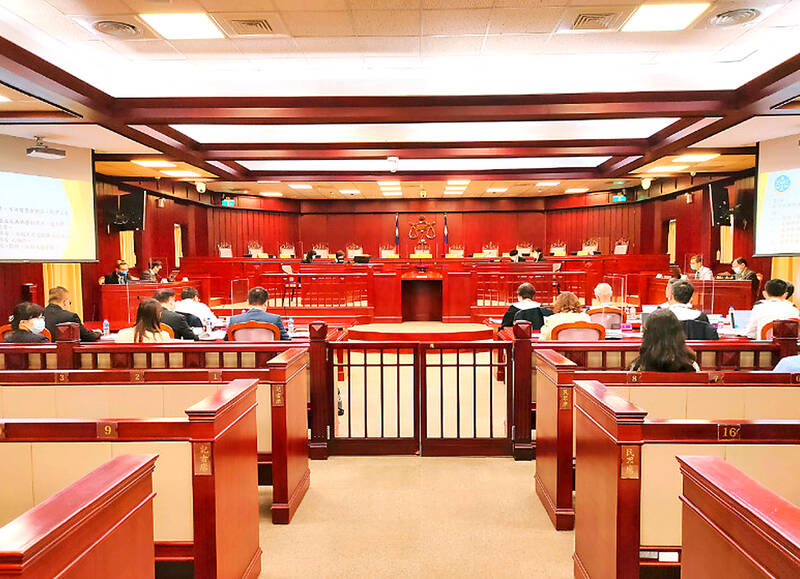The Constitutional Court in April is to hear oral arguments on whether the death penalty is constitutional, and a ruling is to be made in three months, with an extension of two months allowed if needed, it said on Thursday.
Thirty-seven death-row prisoners have filed a petition for a ruling on whether the death penalty is unconstitutional based on the principles of the right to life, human dignity and proportionality.
The Constitutional Court said that it would review a petition filed in 2022 by Wang Xin-fu (王信福), the oldest man on death row in Taiwan, along with related cases filed by death-row prisoners, in an oral argument session to be held from 10am to 4pm on April 23.

Photo: Taipei Times file
The arguments could center on two questions.
The first is whether the death penalty, a legally prescribed punishment, is constitutional.
The court said it wants to clarify whether, in addition to the right to life, the death penalty infringes upon other rights protected by the Constitution, such as the right not to be tortured or the right to human dignity; whether the pursued goals of the death penalty system are constitutional; and whether there are other means of punishment and supplementary measures available if the death penalty is deemed unconstitutional.
The second question is if the death penalty is determined to be constitutional, whether the court should limit the types of crimes that it can be applied to.
The court said it would also seek clarity on whether the crimes that the petitioners were sentenced to death for are still constitutional and why, and whether the scope of criminal death sentences should be limited, as Article 19 of the Criminal Code stipulates that an offense is not punishable if it is committed by a person who has a mental disorder or disability, and the punishment may be reduced as a result of their capacity for judgement.
Under the Constitutional Court Procedure Act (憲法訴訟法), the verdict should be pronounced within three months after an oral argument, and an extension of two months is allowed when necessary.
The cases originally included three other death-row prisoners, but they had died of illnesses in detention centers, so their cases would not be reviewed this time.
As Judicial Vice President Tsai Chiung-tun (蔡炯燉), Grand Justice Tsai Tsai-chen (蔡彩貞) and Grand Justice Greg Yo (尤伯祥) have participated in the trials of death-row prisoners, they would not participate in the hearing, the Constitutional Court said.

Conflict with Taiwan could leave China with “massive economic disruption, catastrophic military losses, significant social unrest, and devastating sanctions,” a US think tank said in a report released on Monday. The German Marshall Fund released a report titled If China Attacks Taiwan: The Consequences for China of “Minor Conflict” and “Major War” Scenarios. The report details the “massive” economic, military, social and international costs to China in the event of a minor conflict or major war with Taiwan, estimating that the Chinese People’s Liberation Army (PLA) could sustain losses of more than half of its active-duty ground forces, including 100,000 troops. Understanding Chinese

The Ministry of Foreign Affairs (MOFA) yesterday said it is closely monitoring developments in Venezuela, and would continue to cooperate with democratic allies and work together for regional and global security, stability, and prosperity. The remarks came after the US on Saturday launched a series of airstrikes in Venezuela and kidnapped Venezuelan President Nicolas Maduro, who was later flown to New York along with his wife. The pair face US charges related to drug trafficking and alleged cooperation with gangs designated as terrorist organizations. Maduro has denied the allegations. The ministry said that it is closely monitoring the political and economic situation

UNRELENTING: China attempted cyberattacks on Taiwan’s critical infrastructure 2.63 million times per day last year, up from 1.23 million in 2023, the NSB said China’s cyberarmy has long engaged in cyberattacks against Taiwan’s critical infrastructure, employing diverse and evolving tactics, the National Security Bureau (NSB) said yesterday, adding that cyberattacks on critical energy infrastructure last year increased 10-fold compared with the previous year. The NSB yesterday released a report titled Analysis on China’s Cyber Threats to Taiwan’s Critical Infrastructure in 2025, outlining the number of cyberattacks, major tactics and hacker groups. Taiwan’s national intelligence community identified a large number of cybersecurity incidents last year, the bureau said in a statement. China’s cyberarmy last year launched an average of 2.63 million intrusion attempts per day targeting Taiwan’s critical

‘SLICING METHOD’: In the event of a blockade, the China Coast Guard would intercept Taiwanese ships while its navy would seek to deter foreign intervention China’s military drills around Taiwan this week signaled potential strategies to cut the nation off from energy supplies and foreign military assistance, a US think tank report said. The Chinese People’s Liberation Army (PLA) conducted what it called “Justice Mission 2025” exercises from Monday to Tuesday in five maritime zones and airspace around Taiwan, calling them a warning to “Taiwanese independence” forces. In a report released on Wednesday, the Institute for the Study of War said the exercises effectively simulated blocking shipping routes to major port cities, including Kaohsiung, Keelung and Hualien. Taiwan would be highly vulnerable under such a blockade, because it